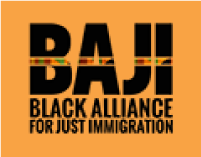Blog
Meet Maraky, BAJI’s LA organizer
By, Maraky Alemseged
Throughout the Covid-19 pandemic, Black communities have been hit hardest with little to no systematic support. Although many grassroots efforts emerged and were life-affirming, when grave illness hits, you’re forced to turn to the systems that fail you. At BAJI, I have found what it means to love and care for all Black people.
As a Black woman, not only have I experienced medical neglect firsthand, but I have also witnessed the harm it has caused to family and friends. I have watched as white supremacy exists in “healing” institutions creating feelings of helplessness against these giant systems of oppression.
That helplessness was apparent when my grandma, a Black migrant who had been a US resident for 28 years, was hospitalized for a stroke and faced medical racism. While she was multilingual, she didn’t speak English but the hospital refused to allow someone from our family to be her translator. Medical staff repeatedly misdiagnosed her condition and claimed she was speaking gibberish when speaking Amharic. This gross medical negligence steeped in anti-Blackness, and denial of the basic human right to language access, caused my grandma to suffer in her last days.
In the midst of grieving our matriarch, the world was in flames as people took to the streets to combat the pandemic of systemic violence against Black people. It was during this tumultuous time that I dove into activism. Before my family could catch our collective breath, we were struck with another tragedy when COVID stole the life of my godmother, also a Black migrant. If it was not for the US government’s gross mishandling of this global pandemic, my godmother and countless others would still be alive today.
Advocating for the care and wellness of all Black people is integral to the movement for Black liberation. I’m so grateful to organize with BAJI, where we actively practice the principle of Sankofa, which in its direct translation says “it is not taboo to fetch what is at risk of being left behind.”
BAJI’s mission to leave no person behind, and to fight for those who are at risk of being forgotten has shown me that it is possible to advocate for yourself and for others. The work we do to ensure that no one is ever without the resources needed to live and thrive is what brings me hope. As Mariame Kaba states, “hope is a discipline,” and it’s a discipline I see practiced every day at BAJI in the work that we do to educate, advocate, and work toward liberation for our people.
A mantra we often say at BAJI is “until the most marginalized of the least privileged is free, none of us are free.” What a supremely divine declaration of unconditional love.
